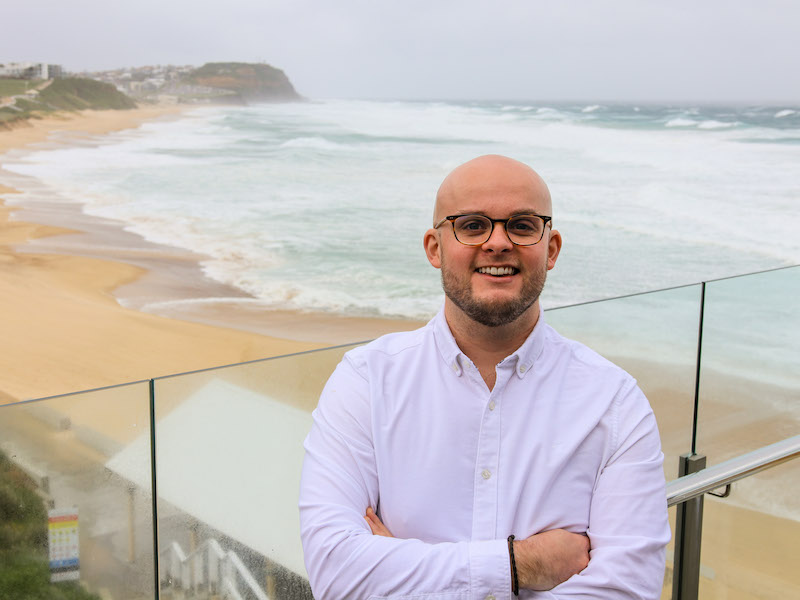Researcher Highlights
Tempestuous winds and vulnerable island nations
Andrew Magee
Climate change presents us all with a lot of uncertainties. From tropical cyclones to floods – researcher Dr Andrew Magee is studying interactions between the ocean and atmosphere and historical variability of these extreme events to help better understand past, present and future risks.

Tropical cyclones are exceptionally erratic, in terms of where they form and how many form per season.
“My work looks to better understand what drives the variability of extreme weather events, mainly tropical cyclones from when and where to how many form per season in the Australian and South Pacific regions.
“I investigate how changes in the ocean and atmosphere influence the formation and movement of these cyclones,” said Andrew.
“By better understanding how these cyclones have varied in the past and understanding the drivers that result in more or less cyclones, we are able to gain a better picture of what may happen in the future.”
With an interest in the role that weather-related traditional knowledge can play in helping inform tropical cyclone prediction, Andrew has travelled extensively across the South Pacific region to observe more traditional means of weather forecasting.
“Fieldwork has taken me to Fiji, Vanuatu and Tonga to collect weather-related traditional knowledge from Indigenous communities including how plant and animal behaviour can change in the days and months preceding a cyclone event. I’ve also investigated local perceptions on the delivery and reliability of current tropical cyclone information provided by local meteorological agencies.”
Reducing disaster risk across the Pacific
The Southwest Pacific tropical cyclone season typically runs from November to April and the island nations and territories in this area are extremely vulnerable to tropical cyclone related impacts, including extreme and damaging winds, intense storm surge, and prolonged rainfall and flooding, which adversely affect people, infrastructure and economies.
Years of research culminated in the development of the Long-Range Tropical Cyclone Outlook for the Southwest Pacific (TCO-SP). TCO-SP provides island-scale tropical cyclone outlooks months before the official start of the southwest Pacific tropical cyclone season.
New tropical cyclone outlook model has potential to save lives in the Pacific
The new outlook model will better equip Pacific Island National Meteorological Services, government and aid agencies, decision-makers and the general public in communicating and preparing for future tropical cyclone seasons across the Southwest Pacific.
“The provision of accurate and timely seasonal tropical cyclone outlooks are essential for informed decision making, and if we can just make small incremental steps in reducing disaster risk and informing the population of the risks associated with the coming cyclone season, then it has the potential to save lives," said Andrew.
“Rising sea levels and changes to tropical cyclone related exposure and vulnerability will amplify future tropical cyclone related impacts for Pacific Island nations and territories. Our new outlook plays an important role in building a more resilient future for Pacific Island communities.”
Making an impact
The impact of Andrew’s work is wide-reaching – from Australia to the Pacific island nations and territories and around the world.
“My work has helped researchers and end-users better understand what drives current tropical cyclone risk and how considering a range of climate influences, is the most holistic way to evaluate these potential risks.
“This work means that people and communities can be better prepared for current and future weather events.
“Specific to the South Pacific region, we know these island nations are inherently vulnerable to the effects of tropical cyclones and other natural disasters.
“Understanding the how and why behind tropical cyclone behaviour enables us to produce more accurate forecasting, with the potential of improving preparedness and resilience for vulnerable communities of the Pacific islands.”
Andrew is a Pacific climate science expert panel member for the Australia-Pacific Climate Partnership and is currently engaged with governments, aid agencies and financial institutions across Asia-Pacific to assist in better understanding climate-related vulnerability and risks.
Weather and insurance
Andrew also works closely with key players in the Australian insurance industry to help them understand what climate variability and change might mean for insurers and consumers.
“Along with modelling natural peril risk (tropical cyclones, bushfire, flood, storm, coastal inundation) and applying geospatial analysis to a range of data sources at the address-level within Australia, I also assist with developing weather-related insurance products for farmers in Australia.”
Climate education
As well as being involved in cutting-edge scientific research, Andrew is a passionate educator. Recently, Andrew was involved in a project to develop short-term training courses for meteorological and environmental organisations based in the Pacific.
“These three courses teach the fundamentals of Pacific meteorology, climatology and climate change, and are aimed at capacity building in a region that is exceptionally vulnerable to the effects of climate variability and change. This course helps equip meteorological and environmental agency staff with the knowledge and skills to better understand key aspects of Pacific weather and climate, and aims to help decision-makers make more informed decisions in the face of a variable and changing climate.”
These courses are accredited by UNITAR and have been delivered to Pacific Island National Meteorological and Hydrological Services and other government organisations in the Pacific.
Preparing for the future
“I feel proud that my work helps improves our understanding of what cyclones looked like in the past and how our complex climate system influences tropical cyclone activity. This information will work behind the scenes to help improve the reliability and methodology of deriving more accurate forecasting.
“I will continue to work to understand how changes in future natural peril risk will impact people, places, business and infrastructure.”
The University of Newcastle acknowledges the traditional custodians of the lands within our footprint areas: Awabakal, Darkinjung, Biripai, Worimi, Wonnarua, and Eora Nations. We also pay respect to the wisdom of our Elders past and present.
